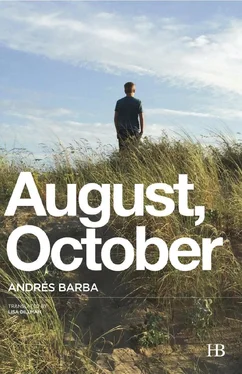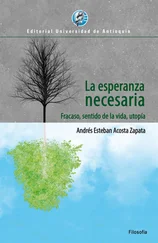He’d left a note saying that he’d taken the money, he had to do something important, he had to go away for a few days. He’d be fine. They shouldn’t worry. He wrote it quickly and then thought it childish. He tore it up and wrote another, this one more succinct, apologizing and asking them to have faith in him even if they didn’t understand him. He added that he’d return the money as soon as he could, he’d work to pay them back. He signed it. In a postscript, he told them not to call his cell phone — he’d left it in his room, turned off.
Aside from the escape itself, he’d made no further plans, so during the several-hour journey he tried, fruitlessly, to think about how he was going to manage once there and what it was he actually wanted to do. He regretted not having brought warmer clothes, because all he had was a couple of T-shirts and the sweater he was wearing. It had started to rain again. He wanted to see her, that was all. He wanted to see her even if it was just once and from afar, that might be enough. He didn’t really know what he wanted, but for the first few hours he felt possessed by an almost violent euphoria that gradually diminished the closer the bus got to town.
It was completely dark by the time he arrived, and his mood had turned melancholy. He had a hard time almost even recognizing the place. It was the same effect as a house that’s been lived in for years and then suddenly has all the furniture removed; it was all at odds somehow, smaller maybe. There was no one out on the street. It was cold.
He got scared for the first time when he realized that the electricity at Aunt Eli’s house had been cut off. He didn’t want to make any noise, for fear of the neighbors realizing he was there, so he groped his way around in utter darkness and a state of panic, trying to find a window, colliding with chairs, a sofa. Something fell onto the floor and broke, making a sharp, shattering sound that caused him to whip around in the dark, terrified. He felt as if a shadow had just passed, brushing against him. He was exhausted from the trip and had a chill; he hadn’t had dinner. He thought his parents were probably hysterical, might have called the police, thought Anita wouldn’t be able to sleep that night. The house was damp, and when he got into bed, the sheets and blankets felt almost wet. Aunt Eli’s smell was still strong, a stale, sweet smell, like cinnamon or an alcoholic’s sweat. He piled on several blankets, still fully clothed, and curled into a ball, trying to get warm. He’d never felt so miserable in all his life, or so fragile, or so guilt-ridden, but something inside him remained steadfast, as though each movement he made were a quiet rejoinder— I want this, I choose to be here . He fell asleep. A blank, terrifying sleep, extremely deep, imageless. In the darkness, the yellowy light of a streetlamp filtered through a hole in the broken blinds like a needle, glimmering.
He rose at dawn, starving, and inspected the house. Opening the blinds just the tiniest bit, he recalled the summer day he’d been there with Anita. It seemed almost comical that he’d been so scared the night before; it was just the same old house he remembered from that summer, with a huge, kitsch painting of the aqueduct in Segovia, little porcelain souvenirs, photos of his uncle, his parents, even one of him and Anita. It moved him now in a way it never had before, as if Aunt Eli’s life were still there, resting, infused in each of the things that had once been hers, and he got the feeling, for the first time, that he was experiencing an exclusively female world. He felt like he could see thousands of tiny emotional threads connecting all of those things, attached to the Great Women of History collection on the bookshelf, contained within the immaculate kitchen, tucked into the slightly sunken, green sofa on which she’d arranged a crocheted doily in the guise of an armrest, to hide a wine stain. Aunt Eli’s life, in that house, was a mental state, a whirlwind of supremely concentrated details. It made him feel sorry not to have loved her more.
Walking through town, he got the same feeling he’d had at Aunt Eli’s. The morning was sunny but still cold, a damp cold that seemed to radiate upward from the ground. Almost all of the shops were closed, and the estuary looked kind of dirty — full of algae, sticks, a few plastic bottles that the tide had dragged in. It was as though some great misfortune had befallen the town, a plague or a siege, as though the people who’d lived there had fought viciously and then given up, the way primitive peoples gave up when their fields were burned down or an invading army took over and forced their citizens into slavery. Those remaining had a slightly pensive, defeated air — survivors of the shipwreck — but the same lassitude as in summer, a lassitude that now seemed not festive but indolent.
It took him several hours to ascertain, after having asked half a dozen people, where he might find a school for developmentally disabled kids. He was sent to the regular high school, in the end, and there he discovered, thanks to the secretary, that the classes for those kids were held at another location, in rooms the local council had provided clear on the other side of town. Day had broken fully, and in the sun, at least, it was actually a little warm. He felt a moment of something akin to nervous glee on his way there. It was time for the students to start school. He watched them in the distance, a colorful silhouette, about twenty people in all. What he saw was so different from what he’d imagined that he hesitated a bit as he approached. All of the students were about his age, though some were younger, but they seemed to have vastly different disabilities. Some were clearly withdrawn and silent, others shrieking; it seemed kids with Down’s syndrome were mixed in with others who were mildly autistic. He’d never seen so many mentally disabled kids in the same place before and wasn’t prepared for the speed and noise and fury with which they seemed to live. The false joy he’d felt as he got closer vanished immediately, replaced by a sense of horror and insecurity, a feeling of intense ridiculousness. He stepped into the warm, compact group swirling around the entrance, feeling the contact of mothers on either side of him, of adolescents running beside him. Suddenly he became self-absorbed. Not a daydream but a sort of vague, confused, fluctuating evocation. It was as if all of those women and all of those teenagers had lost their individual characteristics, the things that made them concrete and definable, and for a moment all gave off one common scent. Finally he asked one of the teachers about Marita.
“You’re her brother, right?”
And without knowing why, he replied, “Yes.”
“It’s a disgrace,” she said. “That girl only shows up when she feels like it. And it’s your fault — yours and your parents’.”
He didn’t see her once, despite the fact that he spent the entire day walking all over town in the hopes of happening upon her at any moment. He knew he’d stand a better chance of finding her if he went over toward the boxy houses by the estuary, but he was afraid of running into Pablo, Marcos,Tejas, or Rivero. He felt ridiculous, and nervous. His states of mind jostled, overlapping one another like absolute states with no shading or gradations — anxiety, tedium, embarrassment, concern for his parents. Sometimes they formed a sort of parenthesis around his mind, which would go blank, and he’d feel something like a caving-in, and sorrow; that was the one harsh, constant sensation of the day. The only thing that slightly consoled him was knowing that those were the same streets Marita walked, the same people she would pass if she went out, the same trees, the same estuary, the same ground she walked on.
Читать дальше












